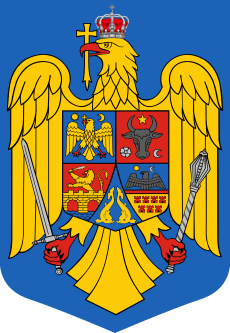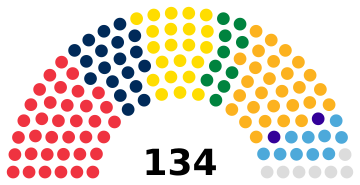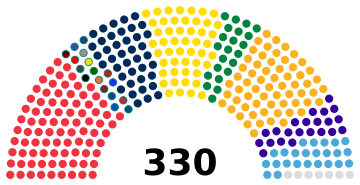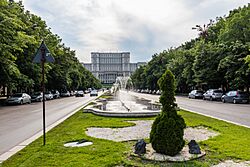Parliament of Romania facts for kids
Quick facts for kids Parliament of RomaniaParlamentul României |
|
|---|---|
| 9th Legislature | |
 |
|
| Type | |
| Type | |
| Houses | Senate Chamber of Deputies |
| History | |
| Founded | 1862 1990 (current form) |
| Leadership | |
|
Mircea Abrudean, PNL
Since 24 June 2025 |
|
|
Sorin Grindeanu, PSD
Since 24 June 2025 |
|
| Structure | |
| Seats | 134 Senators 331 Deputies |
 |
|
|
Senate political groups
|
Government (89)
Opposition (45)
|
 |
|
|
Chamber of Deputies political groups
|
Government (205)
Supported by (17)
Opposition (108)
|
| Elections | |
| 1992–2008, 2016–present: Closed list, D'Hondt method 2008–2016: Mixed member proportional representation |
|
|
Chamber of Deputies voting system
|
1992–2008, 2016–present: Closed list, D'Hondt method 2008–2016: Mixed member proportional representation |
|
Senate last election
|
1 December 2024 |
|
Chamber of Deputies last election
|
1 December 2024 |
|
Senate next election
|
On or before 2028 |
|
Chamber of Deputies next election
|
On or before 2028 |
| Meeting place | |
 |
|
| Palace of the Parliament, Bucharest, Romania | |
| Website | |
| http://www.parlament.ro/ | |
The Parliament of Romania (in Romanian: Parlamentul României) is the main law-making body of Romania. It is made up of two parts: the Chamber of Deputies and the Senate. This system, with two houses, is called bicameral. The Parliament meets in the impressive Palace of the Parliament in Bucharest, which is the capital city of Romania.
The Parliament's job is to discuss and approve new laws for the country. It represents the people of Romania and works to make sure their voices are heard in how the country is run.
Contents
Understanding Romania's Parliament
Before 2003, both houses of Parliament had the same powers. This meant that any new law had to be approved by both the Chamber of Deputies and the Senate in exactly the same way. If there were differences, a special group of members from both houses had to work together to find a compromise. This process could sometimes take a long time.
How Laws Are Made Today
After some changes to Romania's Constitution in 2003, the process became a bit different. Now, while both houses still need to approve a law, one house is often the "deciding chamber" for specific topics. This means that for certain types of laws, one house gets to discuss and vote on it first. If they approve it, it then goes to the other house. If the second house makes changes, the law goes back to the first house, and their final decision is the one that counts. This helps make the law-making process more efficient.
In 2009, people in Romania voted in a special referendum to see if they wanted to change the Parliament to have only one house and fewer representatives. Even though most people voted yes, this change needed another, more official vote to actually happen. So, the Parliament still has two houses today.
A Brief History of Romanian Lawmaking
The idea of a parliament in Romania began a long time ago, in 1831. A document called "The Organic Statute" helped set up the first steps for a parliamentary system in the Romanian lands. This was a big step towards modern government.
Later, in 1858 and 1864, more changes were made. A new system was introduced that created a two-house parliament, similar to what we see today. This helped Romania's government become more like those in other parts of Western Europe. These changes were important for the union of the two Romanian Principalities in 1859, which brought Wallachia and Moldavia together.
Many important moments in Romanian history happened within the Parliament. For example, Romania declared its independence on May 9, 1877. Also, in 1920, documents were read in Parliament that officially united Transylvania and Bessarabia with Romania, creating a larger country known as Greater Romania.
During the period leading up to World War II, there were times when the Parliament's power was reduced. For a while, a king ruled with more authority, and the Parliament became less important. After the war, under the influence of communist forces, the Parliament changed again, becoming a single body that mostly followed the decisions of the Romanian Communist Party.
Restoring Democracy
The Romanian Revolution in December 1989 brought big changes. It allowed Romania to become a true representative democracy once more. This meant that people could choose their leaders, and the government had to respect human rights and share power.
After the revolution, Romania returned to having a two-house parliament: the Chamber of Deputies and the Senate. These new rules were written into the country's new Constitution, which people approved in 1991.
Since then, the Parliament has worked hard to create new laws that helped Romania become a democratic country. These laws focused on protecting human rights, improving the economy, and strengthening the rule of law. These efforts helped Romania join important international groups like NATO in 2004 and the European Union in 2007.
How Parliament Works: Committees
To handle all the different topics that need laws, both the Chamber of Deputies and the Senate have special groups called committees. Each committee focuses on a specific area, like education, health, or the economy. This allows members of Parliament to become experts in certain fields and work together on detailed proposals.
For example, there are committees for legal matters, budget and finance, foreign affairs, and environmental protection. There are also joint committees where members from both the Senate and the Chamber of Deputies work together on topics that affect both houses, such as European affairs or overseeing intelligence services. These committees help Parliament do its work more effectively.
Who Makes Up the Parliament?
The Parliament of Romania is made up of elected representatives from different political parties. These parties represent various ideas and interests of the Romanian people.
Current Parliament Members (2020–2024)
Here's a look at how the seats are currently divided in the Romanian Parliament, based on the 2020 elections:
| Party | Seats | % | |
|---|---|---|---|
| Social Democratic Party | 46 | 33.82% | |
| National Liberal Party | 37 | 27.20% | |
| Save Romania Union | 22 | 16.17% | |
| Alliance for the Union of Romanians | 12 | 8.82% | |
| Democratic Alliance of Hungarians in Romania | 9 | 6.61% | |
| Force of the Right | 3 | 2.20% | |
| Social Liberal Humanist Party | 1 | 0.73% | |
| Romanian Nationhood Party | 1 | 0.73% | |
| Independents | 5 | 3.67% | |
| Total Senate Seats | 136 | 100 | |
| Party | Seats | % | |
|---|---|---|---|
| Social Democratic Party | 104 | 31.51% | |
| National Liberal Party | 80 | 24.24% | |
| Save Romania Union | 44 | 13.33% | |
| Alliance for the Union of Romanians | 24 | 7.27% | |
| Democratic Alliance of Hungarians in Romania | 20 | 6.06% | |
| Parties of ethnic minorities | 18 | 5.45% | |
| Force of the Right | 16 | 4.84% | |
| Renewing Romania's European Project | 10 | 3.03% | |
| Social Liberal Humanist Party | 4 | 1.21% | |
| Romanian Nationhood Party | 4 | 1.21% | |
| The Right Alternative | 3 | 0.90% | |
| Alliance for the Homeland | 1 | 0.30% | |
| Association of Italians of Romania | 1 | 0.30% | |
| Independents | 1 | 0.30% | |
| Total Chamber of Deputies Seats | 330 | 100 | |
See also

Images for kids
 | Bayard Rustin |
 | Jeannette Carter |
 | Jeremiah A. Brown |



















